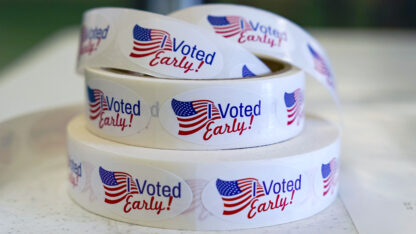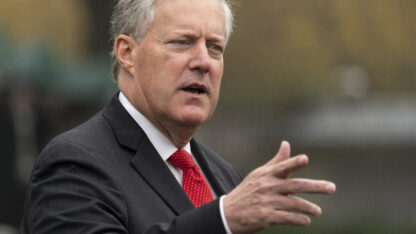Former Trump aide Meadows loses bid to avoid Fulton grand jury probe into 2020 election interference
Donald Trump’s chief of staff Mark Meadows is the latest ally of the former president ordered to appear before a Fulton County special grand jury just ahead of a final court decision on a standing U.S. Sen. Lindsey Graham’s subpoena.
A South Carolina judge ordered that Meadows must comply with a subpoena as part of an investigation being led by Fulton County District Attorney Fani Willis into efforts to overturn the 2020 presidential election in which Trump suffered a defeat to Democrat Joe Biden. A law firm representing Meadows said in a statement on Wednesday that it is planning to protest Circuit Court Judge Edward W. Miller’s order compelling Meadows to testify in the probe that’s also engulfed Trump compatriots like the ex-president’s former personal attorney Rudy Guiliani and Graham, the Republican South Carolina senator whose challenge is now before the U.S. Supreme Court.
Meadows’ attorneys have argued that he is entitled to executive privilege and that he cannot be compelled to testify before a special grand jury that they say is pursuing a civil dispute, not a criminal investigation. This year, the 25-member panel has heard testimony from dozens of witnesses ranging from elected officials to attorneys and election officials and workers.
“Because of the unusual nature of the Georgia proceeding, some of these issues have never been addressed in South Carolina,” attorney James Bannister said in a statement. “We are looking into legal options based on the judge’s ruling from the bench. It would be inappropriate to comment further on these issues until the judge has issued a final written order.”
In August, Meadows was originally scheduled to show up at the Fulton courthouse, but a scheduling conflict delayed his appearance until at least November.
Meadows is being asked to testify about his December 2020 trip to Georgia to monitor an audit of the state’s election results and about text messages he sent to Georgia Secretary of State Brad Raffensperger to set up calls with the White House that included the infamous conversation in which Trump pressured Raffensperger to “find” enough ballots to overturn Biden’s win of nearly 12,000 ballots.
Meanwhile, as Meadows fights his subpoena, the U.S. Supreme Court will settle a dispute over a lower court order requiring the testimony of Graham, who reportedly made at least two phone calls to Raffensperger and other state election officials between Election Day 2020 and Jan. 6, 2021, when U.S. Congress certified election results after insurrectionists breached the U.S. Capitol in a last-ditch attempt to keep Trump in power.
That included a December 2020 call that Raffensperger labeled as concerning since the longtime senator asked about him about how the state handles disqualifying questionable absentee ballots.
As a result of Supreme Court Justice Clarence Thomas’ temporary freezing of an appeals court order on Monday, Fulton prosecutors and Graham have until the end of the week to present their arguments before the nation’s highest court.
The special grand jury has up to a year to conduct its investigation before issuing a report with recommendations on whether Willis should pursue criminal charges.
A Fulton judge in charge of overseeing the special investigation has ordered that GOP Gov. Brian Kemp must testify following his Nov. 8 re-election bid against Democrat Stacey Abrams after rejected arguments that the governor should not be compelled to speak because of executive privilege and sovereign immunity.
And the grand jury will also hear from nearly all of the 16 Georgia Republicans who, during a secret December 2020 meeting at the Capitol, served as fake electors and cast illegitimate votes for Trump. A judge ruled in July that Republican state Sen. Burt Jones, who participated in the meeting of fake electors, did not need to testify in Willis’ investigation because she hosted a June fundraiser for his opponent in this year’s lieutenant governor’s race, Democrat Charlie Bailey.








